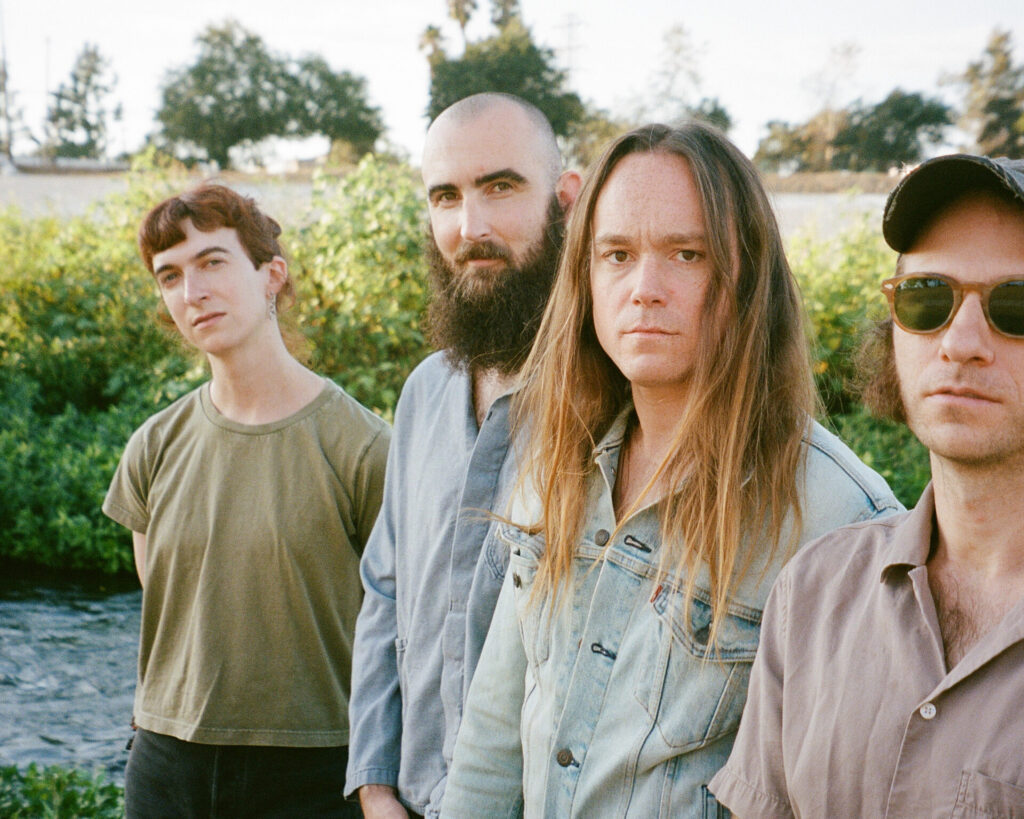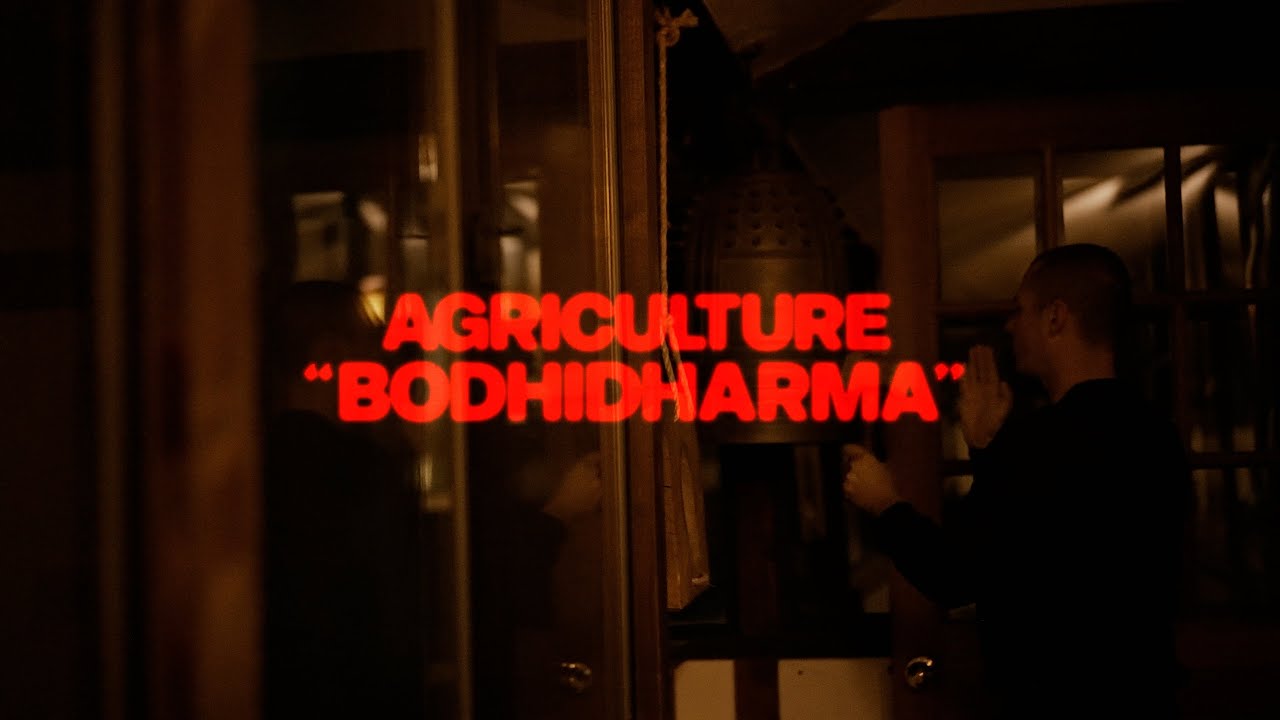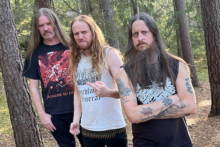The storm clouds are towering over Brighton Palace Pier for Agriculture’s arrival at the Dust nightclub for the second night of their UK tour. They have travelled from Bristol on this leg, evidenced in the branding on guitarist/vocalist Dan Meyer’s new cap: “Stonehenge est. 3,000 BC”. Sadly we don’t get enough time together to discuss their opinions on the Neolithic transition from hunter-gathering to farming.
Seeing Agriculture in a venue fifty metres from the English Channel is fitting considering the band’s love of the sea. From the west coast of the US, they seem eminently comfortable in Brighton. Bassist/vocalist Leah Levinson takes a moment to say as much during their set; the only downer, she laments, is that the city’s Toy Museum was closed that afternoon. When they play ‘The Glory Of The Ocean’ from their self-titled 2023 debut album, Agriculture celebrate the nature of waves: “mass/ Eternal/ Breaking all over themselves”.
Meyer wrote the song when he was getting his “ass kicked” by the ocean on a daily basis as he tried to learn to surf. The process was both sublime and ridiculous, deeply humbling and revivifying.
“I wouldn’t have called the song ‘The Glory Of The Beach’ because it’s kinda silly,” Meyer says around a table with his bandmates in the East Street Tap pub before the show. “But that is kind of what it’s about. When you’re on the beach, you’re like, ‘Wow, what a fun place to hang out and do normal fun, human stuff.’ But then you’re faced with this sort of unimaginable immensity.”
‘The Reply’, the closing song of new album The Spiritual Sound, was inspired by a day when Meyer went down to the ocean and out of nowhere began thinking about World War One. “Europe just destroyed itself for no reason – that’s crazy,” he says.
The quotidian, historical and the spiritual collide in Agriculture’s music. They are a black metal band, but don’t mess with the Satanic tropes of the genre’s forebears. This isn’t really a conscious rejection. In fact, they seem a little impatient with my suggestion that they are upending or deconstructing the genre. New York black-metal band Krallice was a heavy influence on their first recording, but Meyer is adamant: “I wasn’t trying to subvert Darkthrone. It was more just that they weren’t as big an influence as later bands.”
Meyer formed Agriculture with drummer Kern Haug after they met at a noise show in 2019. Haug sports a mean pair of mutton-chop sideburns, which might account for the fact there was a rumour going around the audience at the Salford stop on this tour that the band is Amish. After COVID restrictions eased off, the pair recruited Bay Area thrasher Richard Chowenhill on lead guitar. With his long, fine brown hair and chiselled jawline, Chowenhill looks like you might have found him skateboarding in a drained swimming pool in his teenage years in California. After their original bass player left in a huff when Meyer kept rearranging their parts, Leah Levinson joined the band on bass, also providing Meyer a counterpart as co-vocalist and co-lyricist.
Though the band plays up their hipster credentials – Meyer describes himself as a “poser” and the back of one of their T-shirts at the merch stand archly reads, “I love the spiritual sound of ecstatic black metal by the band Agriculture” – they squash any sense of trying to achieve an ironic stance in their music.
“I think the difference with what we’re doing is that we’re really earnest about where we’re pulling all that from, and postmodernism is doing that as a distancing effect,” says Levinson. “But our interest in all this different kind of music, and bringing it together, is almost more from seeing a through line with it, and seeing it as different avenues towards expressing whatever we really want to get at.”
‘Flea’, from the new album, begins with an observation of an everyday scene: “my dog’s haunting rabbits in the yard/ Casey’s at home, watching tv”. Levinson describes it as an increasingly “wordy” song which ascends to high drama and a rumination about “trans suicidality.” Levinson manages to impart all this through a banshee shriek, and an out-for-blood glare onstage.
“I think the experience of ideation is so often just a daily experience,” she says. “It’s like a thought that occurs in your head while you’re doing whatever other life stuff. For me, part of what I’m thinking about with those topics in my lyrics is: how do I represent that and portray that without making a spectacle of it, or without playing into clichés around it.”
For Agriculture, the vocabulary of black metal allows specific musical gestures which are incredibly intense. So rather than needing to express themselves through violent moments that rip through reality (such as by shooting themselves, murdering each other, or burning down churches), they suffuse the everyday with that intensity instead. In doing so, they don’t transcend black metal as much as inhabit its spirit so thoroughly they also become its mirror image; an anti-black metal band. That is where the ecstatic moment is achieved.
“The way that we experience reality is riddled with intensity that doesn’t exist except for in our own minds,” says Meyer.

The Spiritual Sound broadens Agriculture’s sonic palette considerably. Chowenhill describes a “musical agnosticism” at the heart of the album. It’s there in the huge opening riff of single ‘Bodhidharma’, and in the moments on second single ‘The Weight’, and elsewhere, where they reduce their sound to a whisper in the vein of Slint. ‘Dan’s Love Song’ is awash with textured guitars, something they recreate live when Chowenhill and Levinson produce bows to saw at their instruments.
In fact, there are several moments onstage where the band walks a dangerous tightrope. Chowenhill’s shredding guitar solos, sweep picking, and Hetfieldian tremolo-picking right hand, could easily make him seem out of place in the maelstrom – or downright cheesy. Instead, his slowly emerging smiles as he hits the sweet spot in his guitar-hero pleasure zone make his performance perhaps the most authentic representation of what the band is driving towards.
The Spiritual Sound contains repeated melodic motifs across tracks, most strikingly from the end of ‘Micah (5.15am)’ into ‘The Weight’, as well as ‘Hallelujah’, on which Meyer sings in solitary reverie, reprising some of the themes of ‘Bodhidharma’ (they were originally conjoined in one composition). At times, Meyer in his more delicate, exploratory moments is like a cross between Jeff Buckley standing solo (just slightly), a less pumped-up version of Baroness’ John Dyer Baizley, and Harvey Milk’s Creston Spiers.
“Things explode outward,” says Chowenhill of the band’s songwriting. “There’s this process of taking things apart. One of them [Meyer or Levinson] will come in with a really potent seed – a really dense idea. And within that idea, often – not always – but often what happens is not only do the parts get scrapped and then we add new parts – everybody gets their own part – but temporally it explodes out. And at the end of a rehearsal, the fifteen seconds that we were just trying to get right ended up being about two-and-a-half minutes or three minutes. Oh, maybe this is just its own song.”
For Meyer, the blast beats that propelled the first album “neutralized rhythm”, affording the band a “blanket” beneath which they could go in multiple directions. This is particularly so on Agriculture’s relentless closer, ‘Relier’. One of the things the earlier recordings conceal is the technicality of Haug’s drumwork. But it shines through live in the final section of ‘Living is Easy’, from an EP released last year, where he is cutting geometric patterns out of the onslaught.
I’ve seen a lot of extreme metal drummers at work, but never with the low-handed, freeform Buddy Rich-style intensity of Haug (the skronk-sax break in ‘Look, Part 1’ from Agriculture evinces little fear of free jazz for the band, either). Alongside T.J. Childers of Inter Arma, Haug is one of the most exciting live metal drummers I’ve seen in years. He operates in a space where rhythm is implied rather than specified.
“That’s a big thing for me,” agrees Haug. “For sure: listening to bebop albums where I would just sit there and let it wash over me. I love jazz drummers. I’m not trained in that, but just sitting there, thinking, ‘What’s happening?’ There’s this propulsion that is kind of following the melody, and it almost doesn’t matter. It doesn’t matter what it’s doing, but the song is moving forward and responding, and you’re in it.”
One of things Meyer impresses on me is this way that the band chooses to respond to things. In his view, Agriculture is inspired by other music, but it doesn’t respond to it overtly. Instead, he returns to that idea of responding to their life experiences musically, and pushing at things, most of which aren’t musical.
‘Bodhidharma’ encapsulates a lot of this with a narrative about “The Great see-er who cut off his eyelids/nAnd stared at a wall for 9 whole years”, interleaved with Levinson’s observations that a friend doesn’t appear to be doing great: “You look like you’re dying”. The song’s video was shot in a Buddhist commune where you get to see the members vacuuming and going about their day (“normal dudes in sweat pants from Walmart”, as Meyer puts it). The profound and the mundane don’t sit side by side in Agriculture’s music, as much as merge.
“That’s the whole thing,” says Meyer. “There is an argument in the record. We’re making an argument that spiritual life is daily life. And that the important stuff happens all the time, and just drawing attention to that. Maybe, yeah, the little things are really metal.”
The Spiritual Sound by Agriculture is released by The Flenser on 3 October







